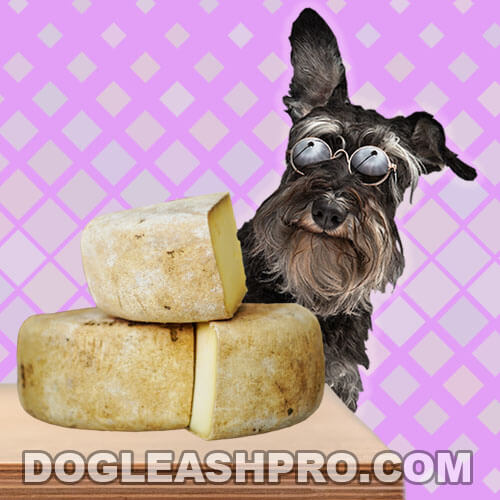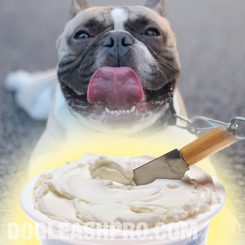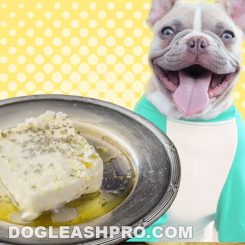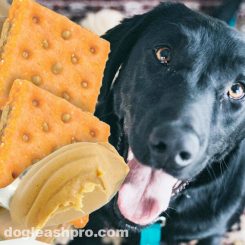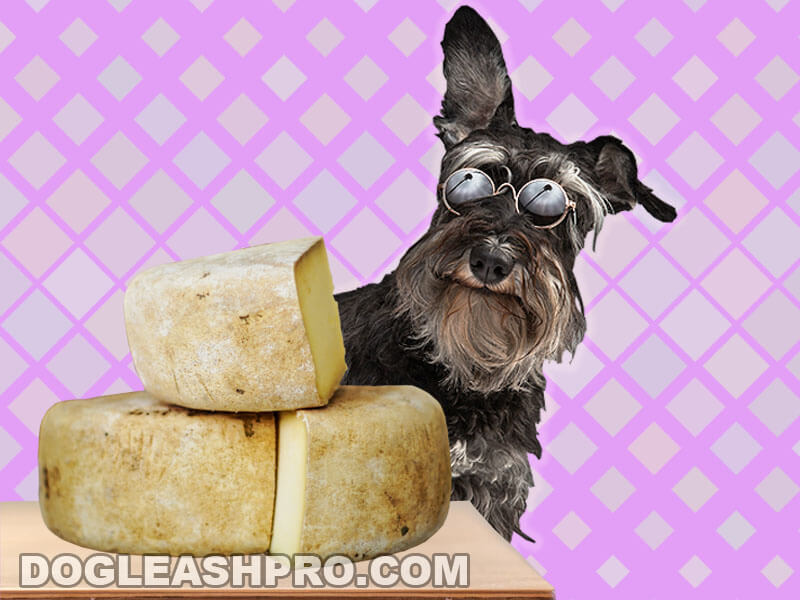
You’re adding some melted Provolone Cheese to your baked pasta dishes when your canine friends come running over. As he’s looking at the ooey-gooey Provolone Cheese melting over the pasta, he starts to drool. Your pup starts begging with his puppy dog eyes and this had you wondering, Can dogs eat Provolone? Before you share that Provolone Cheese with your dogs, here’s what you want to know first.
Can dogs eat Provolone Cheese? No, dogs should not eat Provolone Cheese, especially if they are lactose intolerant or allergic to dairy products. Provolone Cheese is also calorie-dense and high in both sodium and fat. If your dog isn’t lactose intolerant, then you can offer a tiny piece of Provolone Cheese as an occasional treat every now and then. Avoid giving your canine companion Provolone Cheese regularly or daily.
In this guide, we will discuss why you shouldn’t share Provolone Cheese with your dogs and if you do, how much of it is safe for doggy consumption. Since most adult dogs are lactose intolerant, we’ll also go over signs of lactose intolerance in dogs and what to do if your dog accidentally ate a lot of Provolone Cheese.
Table of Contents
Can dogs have Provolone Cheese?

Ideally, dogs should not have Provolone Cheese since this type of cheese is packed full of sodium and fat. Provolone Cheese also contains saturated fat which is not healthy for our furry friends.
In order to fully understand why our furry friends should not have Provolone Cheese regularly, we need to understand what Provolone Cheese is. We should also take a look at both the ingredients and the nutritional profile of Provolone Cheese and see how they can negatively impact our dog’s health if consumed daily or regularly.
What is Provolone Cheese?
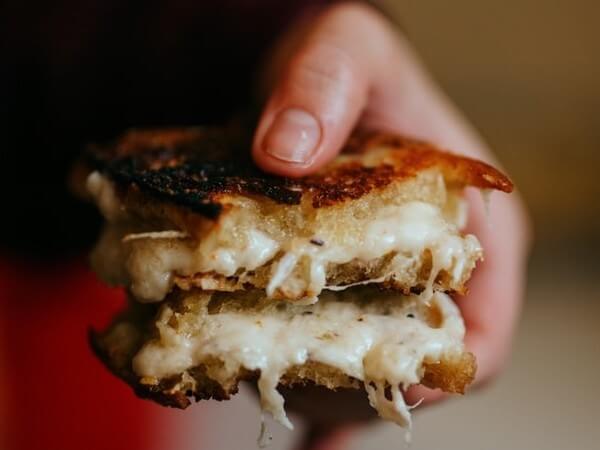
The Provolone Cheese we see in our local supermarket and grocery store today is made from full-fat cow’s milk. The semi-hard cheese is contained with a smooth skin and its taste varies depending on how long it has aged and the enzyme used from either a goat or a calf.
For instance, a Provolone Cheese that has been aged for at least four months will have either a very sharp, piquant taste (also known as provolone piccante) that comes from a goat’s lipase (enzyme) or a mild, sweet taste (also known as provolone dolce) that comes from a calf’s lipase (enzyme).
Although Provolone Cheese is now produced in many countries, including the US, it originated from Campania, Italy. This is why Provolone is known as the Italian Cheese.
This tasty cheese undergoes a normal cheese-making process followed by an aged pasta filata technique in which the stretched curd cheese is plasticized and kneaded in hot water. As a result, the Provolone Cheese has a fibrous texture and structure.
You may be interested in: Can Dogs Eat Cottage Cheese?
So, what is Provolone Cheese made from?
Provolone Cheese is made from the following ingredients:
Ingredients in Provolone Cheese
- Pasteurized milk.
- Cultures.
- Salt.
- Kosher enzyme.
- Natural smoke flavor.
Is Provolone Cheese bad for dogs?
Yes, Provolone Cheese can be bad for dogs if they are lactose intolerant, are allergic to dairy products, or have a food intolerance to dairy products like Provolone Cheese.
If we take a look at the ingredients listed above, right off the bat, some of the ingredients used to make Provolone Cheese can cause digestive issues in dogs.
Milk in Provolone Cheese is harmful to dogs that are lactose intolerant
We can see that pasteurized milk is the first ingredient listed. The first ingredient, pasteurized milk, is what the manufacturer used the most and is what weighs the most compared to all the other ingredients on the list.
This is harmful to our furry friends because most adult dogs are lactose intolerant. Why is this?
When our canine companions are newborn puppies, they nurse from their mother’s milk. It’s important to note that a female dog’s milk has about 3% lactose concentration and newborn puppies generally have an abundance of the lactase enzymes to break down the lactose (sugar) found in their mother’s milk.
As the newborn puppies grow and develop, they start to wean off their mother’s milk and start to eat solid food. During this time, they begin to produce less and less lactase enzyme and become lactose intolerant.
Each dog has varying degrees of lactose intolerance, which means some dogs may experience severe clinical symptoms when consuming dairy products while others may just have mild gastrointestinal distress or nothing at all.
As mentioned before, a female dog’s milk only contains about 3% lactose concentration. Compared that with cow’s milk which contains 5% lactose concentration and you can see why even newborn puppies that need to be nursed can not possibly produce enough lactase enzyme to properly digest cow’s milk.
Additionally, Provolone Cheese contains 0.0 to 2.1% lactose content.
So how do you know if your adult dogs have lactose intolerance?
Here are some signs and symptoms of lactose intolerance in dogs:
- Accidents (peeing or pooping) inside the house.
- Upset stomach.
- Abdominal pain.
- Loss of appetite.
- Weight loss.
- Bloating and becoming very gassy.
- Diarrhea or loose stool.
- Extreme thirst.
- Vomiting.
- Dehydration.
- Weakness.
If you suspect your dog has lactose intolerance, we highly recommend that you confirm your findings with your dog’s vet to be 100% sure. Sometimes, it can be that your four-legged friends are allergic or have a food intolerance to dairy products like Provolone Cheese.
If your Fido has never had Provolone Cheese before, we suggest that you introduce this mild, smoky cheese by giving him a very tiny piece to start with.
After consuming the Provolone Cheese, monitor your pooch closely for the next 12 to 24 hours and look for any reactions or behavioral changes. If you see any of the above signs and symptoms of lactose intolerance, avoid giving him any more Provolone Cheese.
If your pooch is fine after consuming the Provolone Cheese, you can slowly and gradually give him a little bit more. However, we advised giving him too much Provolone Cheese regularly or daily because it is calorie-dense and high in sodium and fat.
Don’t miss: Can Dogs Eat Cheesecake? The Sweet Truth!
High salt content in Provolone Cheese can lead to sodium poisoning in dogs
If we take a look at the nutritional profile of Provolone Cheese, we see that 1 ounce or 28 grams of Provolone Cheese contains 210mg of sodium. While it isn’t a lot to us, this is considered a lot of sodium intake for our precious pups.
Nutritional Profile of Provolone Cheese (1 ounce or 28 grams)
| Name, Unit | Amount |
| Calories, cal | 80.1 |
| Sodium, mg | 210 |
| Carbohydrate, g | 1 |
| Total Fat, g | 5.99 |
| Saturated Fat, g | 3.5 |
| Protein, g | 7 |
| Calcium, mg | 200 |
| Vitamin A, IU | 200 |
| Cholesterol, mg | 15.1 |
All dogs need some amount of salt intake from their daily main meal. Salt is essential because it is an electrolyte and gets turned into ions when it enters your dog’s bloodstream. The ions help maintain proper cellular functions in dogs which include the following:
- Nerve signal transmission.
- Acid-base balance.
- Regulate blood volume and blood pressure.
- Control digestive impulses.
- Maintain a balance of fluid levels in the body.
Our canine friends need 0.06% sodium and 0.09% chloride from each meal on average. According to the National Research Council (NRC), our canine friends need 13.3 mg of sodium per kg of body weight. This means a 10-pound Chihuahua should only have 60.33mg of sodium.
And that 60.33mg of sodium should come from his actual main meal. If you give your small Chihuahua even 1 ounce (28 grams) of Provolone Cheese, then that’s an excess of 210mg of sodium.
Too much sodium consumption can lead to sodium poisoning in dogs. Signs and symptoms of salt poisoning in dogs include:
- Swollen tongue.
- Extreme thirst.
- Frequent urination.
- Nausea.
- Vomiting.
- Abdominal pain.
- Loose stool or watery diarrhea.
- Dehydration.
- Loss of appetite.
- Tachycardia or fast heartbeat.
- Breathing difficulty.
- Convulsions.
- Fluid buildup in the body.
- Fever.
- Confusion.
- Headache.
- Muscle spasms.
- Body weakness.
- Lack of energy.
If you suspect your canine friends have salt poisoning, we highly recommend that you contact your vet right away. Sodium toxicity requires immediate medical attention.
Your dog’s vet may ask you to bring your pup in for a physical exam. They will start to check your dog’s blood pressure, respiration, temperature, pulse rate, and reflexes during a thorough physical examination. The vet will also need to perform the following to find out the sodium level in your dog’s body:
- Urinalysis.
- Complete blood count.
- Blood chemistry.
- Blood gases.
- EKG: electrocardiogram – measures the electrical impulses in your canine friend’s heart.
- Ultrasound.
- X-rays.
- CT scan.
- MRI.
These tests will help the vet determine whether salt poisoning has affected your dog’s heart, brain, and lungs.
Depending on how severe the salt poisoning is, the vet may require that your furry friends stay overnight in the hospital. That’s because it takes time (even up to several days) to bring the salt level down to its normal range. Any sudden changes in the salt levels can actually cause brain swelling (cerebral edema) or even a heart attack.
If you prefer to avoid an unexpected high vet bill, it’s best to keep your dogs away from the Provolone Cheese.
RELATED: Can Dogs Eat Cheese Balls?
Provolone Cheese is calorie-dense and can lead to canine obesity
If we take a look at the nutritional profile of just 1 ounce (28 grams) of Provolone Cheese, we see that it contains 80 calories! That’s a lot of calories for our canine friends.
When it comes to giving our four-legged friends a treat, it’s best to stick to the 90/10 rule. This means 90% of your dog’s daily calories should come from a well-balanced and complete diet while only 10% of his calories should come from treats.
If we deviate from the 90/10, it can affect our dog’s overall health. That’s because too much calorie intake from treats can contribute to weight gain in the short term and lead to canine obesity in the long run.
Check out: Can Dogs Eat Feta Cheese?
High-fat content in Provolone Cheese can lead to diabetes and arthritis in dogs
There are about 6 grams of total fat in Provolone Cheese and of that, about 4 grams is saturated fat. Saturated fats are dangerous to dogs because they are more difficult for the dog’s body to metabolize. Food like Provolone Cheese that contains a high level of saturated fat can put a lot of strain and pressure on the dog’s digestive system as well as internal organs like the pancreas and liver.
If you feed your furry family members Provolone Cheese regularly, it may increase their risk for diabetes, hypertension, arthritis, cardiac disease, and even pancreatitis. Avoid feeding your pooch too much Provolone Cheese, especially if he is older because obesity can increase the risk of heart disease.
Is Provolone Cheese good for dogs?
Provolone Cheese is good for dogs if it’s consumed in moderation and as a rare occasional treat every now and then.
Taking a look at the nutritional profile of Provolone Cheese again, we see that it contains protein, calcium, and vitamin A. Provolone Cheese is also low in carbohydrates.
RECOMMENDED: Can Dogs Eat Cream Cheese?
Protein in Provolone Cheese provides dogs with healthy and strong muscles, skin, and hair
All dogs need protein in order to have strong muscles, healthy skin and hair, and proper bodily functions. In just 1 ounce of Provolone Cheese, there are 7 grams of protein.
Proteins are made up of amino acids and these amino acids help to build skin, hair, nails, muscles, tissues, cartilage, ligaments, and tendons in dogs.
If you offer a tiny piece of Provolone Cheese (ideally less than 1 ounce), your canine friends can benefit from its protein content.
Essentially, protein is important because it helps your dog with the following:
- Repair tissues (including bone, hair, muscle, and skin).
- Maintain cells.
- Support a healthy immune system.
- Make necessary antibodies, enzymes, and hormones.
- Provide your furry friends with energy.
Calcium in Provolone Cheese supports proper bone development in dogs
In addition to protein, Provolone Cheese also provides your canine friends with calcium. All dogs need calcium in order to have proper bone and muscle growth.
If you have a lactating dog or a pregnant female dog, they require high amounts of calcium intake in order to support the growing fetuses inside her and to make enough milk to nurse her litter.
Here are other ways that calcium from Provolone Cheese can help your dog’s overall health:
- Muscle contractions allow your dog to move, walk, run, and play.
- Supports internal organ muscles.
- Aid the cardiac muscle so it can pump blood throughout your canine friend’s body.
Dogs that do not have enough calcium intake daily may experience symptoms of calcium deficiency, also known as hypocalcemia.
Signs and symptoms of calcium deficiency include:
- Muscle weakness.
- Muscle twitching.
- Muscle trembling.
- Convulsions.
- Loss of appetite.
- Vomiting.
- Walking around like he’s drunk or uncoordinated.
- Breathing difficulty.
- Panting.
- Rubbing face against furniture or other objects in the home.
- High fever.
- Seizures (in severe cases).
If you suspect your pooch has a calcium deficiency, speak with your vet and ask for recommended supplements. If you do give your pooch some Provolone Cheese to give him a bit of that calcium intake, make sure it’s a small amount.
Vitamin A in Provolone Cheese supports bone growth and good vision in dogs
Our canine family members need vitamin A in order to have good vision, proper bone growth, strong immune functions, healthy skin, and proper formation of organs in puppies.
However, if you do offer your pooch a tiny bit of Provolone Cheese, make sure it’s 1 ounce (28 grams) or less. This way, they can receive some vitamin A intake without hurting their overall health.
So, can dogs eat Provolone Cheese?
Ideally, it’s best not to share Provolone Cheese with our canine companions. This can be hard since we naturally love to share whatever we’re eating with our four-legged friends.
However, when it comes to our dogs, their health should be our number one priority. Good health means you’re going to have a happy dog that is active and playful and one that will live with you and your family for many years.
So don’t feel bad if you don’t share some of that Provolone Cheese. If you must, you can share less than 1 ounce of Provolone Cheese every now and then but avoid making it a habit.
DISCLAIMER: THIS WEBSITE DOES NOT PROVIDE MEDICAL ADVICE
The information, including but not limited to, text, graphics, images and other material contained on this website are for informational purposes only. No material on this site is intended to be a substitute for professional veterinary advice, diagnosis, or treatment. Always seek the advice of your veterinarian or other qualified health care provider with any questions you may have regarding dietary needs.
Resources:
https://pubmed.ncbi.nlm.nih.gov/32173012/
https://www.cheesesociety.org/wp-content/uploads/2013/07/2013_Safe_Cheese_Storage_Smukowski.pdf

With over five years of specialized experience as an animal writer, my expertise lies in dog nutrition, health, behavior, grooming, and training. I am dedicated to delivering helpful and informative content that caters to the well-being of our furry friends. My primary goal is to empower pet owners with knowledge and ensure our canine companions thrive in health and happiness. In my free time, I love volunteering at local dog rescue centers.
